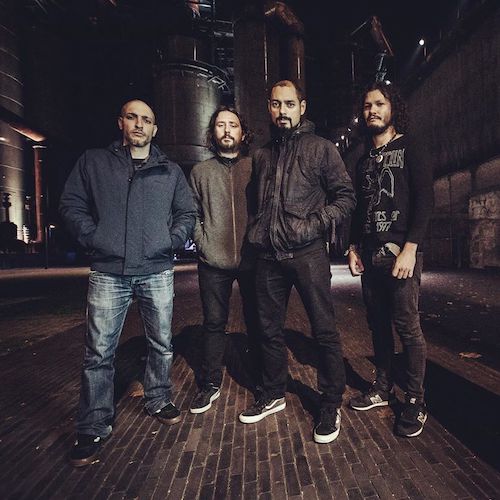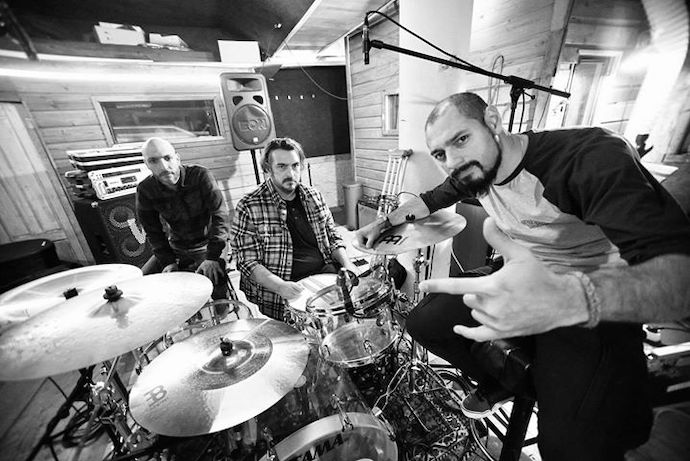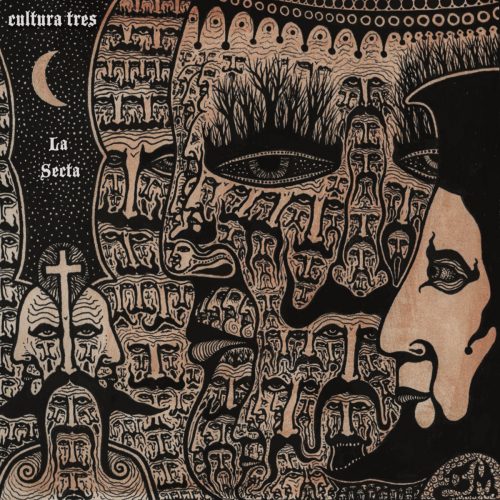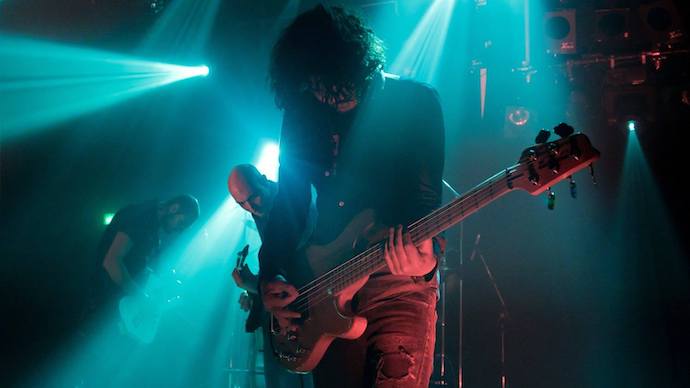(We’ve got a new interview from Comrade Aleks, and this time his discussion partners are members of the heavy Venezuelan band Cultura Tres.)
I try to watch for certain bands’ progress, but sometimes I miss something, as I did with Cultura Tres. Formed in Maracay, Venezuela, in 2006, they pay tribute both to South American cultural and historical legacy and to modern sludge metal. They speak of current problems of their land and of bloody shadows from the past — I believe it’s an important element of any band to keep their ideology actual and hard.
I lost track of the band after their fourth album La Secta, released in 2017, and when I decided to approach the guys a month ago, they appeared to be in The Netherlands to my surprise! May Third World sludge exist and develop in the conditions of the Old World. Let’s find out what’s happening with Alejandro Londoño (guitars, vocals) and Juanma De Ferrari (guitars).
Hi Cultura Tres! How are you? What’s new in the band’s life?
Alejandro: Ha ha ha ha lots, well at least a few major changes since the last time we were interviewed by you guys. We had line-up changes; our old drummer and friend Gollo Altamiranda joined the band (now we are the same old friends that jammed together in a garage in Venezuela in 1995…) We released La Secta in 2017, We have been touring in South America (supporting shows for the Cavalera brothers and weird enough for Dimmu Borgir)
Now we are about to leave for a tour in Spain and right after that we’ll be recording our new album, so in short the years go by but not our willingness to keep doing what we love; playing heavy dark music, the South American way.
You moved from Venezuela to the Netherlands some time ago. Was that hard to organize? Are you there in the full lineup?
Alejandro: We had a first attempt a few years back but we could not fully manage it. Our singer Alejandro went to live in the Canary Islands for some time and our bassist Alonso could not find a legal way to move to Europe (Venezuelans have it difficult when it comes to working visas). Now things have worked out quite well; Alonso is now living in Europe (Bilbao) and is moving to The Netherlands next year. Juanma (our guitarists) and me (Alejandro (guitars/vocals)) are fully stablished in Amsterdam, and our recording studio there is flourishing. Our drummer Gollo left Venezuela as well and now lives between Miami and Amsterdam. Our goal is to have the band totally established in Amsterdam within the coming year but as for now we have managed to get all the recordings and shows going on despite the distance and complicated logistics.
Did you get used to Amsterdam quickly after moving in? What do you like the most there?
Juanma: Mmmmm, A few things were difficult to get used to (actually we will never get used to ha ha) The weather here is super different from the sunny, 30-degree days that we had taken for granted in Venezuela. Rainy dark days are not something we were used to at all, especially in the middle of the winter when the sun disappears around 16:30! But well. with every change there are also lots of positive things along with the not-so-fun changes; the people here are super friendly and respectful. Most people follow the rules and are considerate with others, and that is something we can certainly appreciate. Other than that, moving transportation away from the typical polluting car traffic jam to a fun bike ride has been amazing! (especially in the summer). Amsterdam is so flat and well-suited for biking that you can literally reach any corner of the city with your bike or skateboard — gotta love that!
Did you set everything up in the new place? Do you have now a rehearsal place and all necessary equipment you need to keep Cultura Tres alive?
Juanma: Yes, we have been very lucky that we all work with audio and sound engineering; that has facilitated our access to gear and rehearsal/recording facilities. With a lot of effort we managed to open a recording studio in Amsterdam and Alejandro has been touring with Sepultura as a sound engineer in Europe, so things have worked out perfectly to provide the necessary equipment and place to continue making Cultura Tres’ music. I guess we can’t complain; it probably is a bit of a balance for our other difficulties when it comes to touring with our Venezuelan passports ;).
So yes Cultura Tres are more than ready to tour!
Cultura Tres – Day One (Live in Brazil)
https://youtu.be/NhJjUvRZn7Q
Cultura Tres’ music was the result of your environment and history of the whole region raised on blood. How do you see the band’s prospects now when you’re far from this pressure? Do you feel the same level of inspiration towards writing and performing such music?
Alejandro: I think we are hungrier than ever creatively speaking, especially Alonso and Gollo who were the last to leave Venezuela and have brought with them tons of energy. We come from a place where things were already difficult and in the last years things became even more extreme… This has an impact in all of us. There is no way to escape the news and the pressure you mentioned — our country has become a normalised war zone. The people we love are still there, so there is no way for us to walk away from it in our minds. Our inspiration has reached a new level, the level of the “urge”, the need to speak about what is happening, the need to rebel against oppression (from any sides), and the need to speak out our view about the false hopes of dividing forces. NOW more than ever we want to write and make music for whoever is still listening… It is more than something we would like to do, it is something we HAVE to do.
Does it mean that changes in your music may follow as well? You know, it’s like with Sepultura’s classic Chaos A.D., which was a clear mirror of the situation in their country at that moment. They couldn’t allow themselves to be less aggressive physically, I think.
Juanma: You just hit the nail, yes our music will change to express what we need to express. The core of Cultura Tres’ sound and dissonance will be there but the album will be more extreme. To reflect the lyrics, and as I hear from the demos it will be our heaviest and most aggressive album.
The band was well-known in your region, and I remember you toured Europe previously. But how is it now? Do you feel like you have to build your reputation in a new country from a start?
Juanma: We have harvested a small but loyal group of supporters from various corners of Europe (the European e-zines and playing Desertfest – London sure helped with that). These groups of friends support us with genuine intentions — that can go from a compliment to our music or a share on their social media to buying a shirt on Bandcamp. It all keeps us feeling more and more at home in Europe.
However ironically we do not play often where we are based (The Netherlands). We are not on the radar of the bookers here and it has been difficult to find shows in the area, so we have been performing in other countries where we had been invited to. Maybe in the future we will perform more around here but as it is now it is also good; this is our base of operations and our recording bunker where we prepare what we will bring out there. After our December tour in Spain we have been invited to play the Czech Republic and Germany, so soon we will announce when that will happen. And of course we can’t wait to come back to the UK!
The band’s sound develops from album to album. Is that caused by changes in influences or is it rather an independent process of inner evolution?
Juanma: Ha ha, well the funny thing is that we have hardly change anything in the music we’ve listen to in the last 15 years, so I doubt there are new musical influences. I think what happens is that we change moods and exploring needs on each record we make. What could be true is that the last records have all been composed in different countries, and that probably also brings a new creative environment, from Tenerife in Spain to Rotterdam in The Netherlands to Maracay in Venezuela to Sao Paulo in Brazil and back. We usually write new tracks as we tour and try out ideas while we perform to different audiences. Our aim stays the same, to explore dark corners of the darkness in music; dark evil music is often related to loud music, but in reality is detached from it
There are atmospheric bands who are way darker than any extreme metal band, so darkness in music is everywhere to be found. We try to stick to its trail and end up at different musical destinations, and as we do, it can be doommy death metal, thrash metal, classic rock, or even grunge
We don’t believe in genres, as some have noticed by now.
And yet dare I ask, how do you see Cultura Tres, genre-wise? Sludge? Post? Post sludge?
Juanma: Many people use different labels to describe our music. We can’t blame them for being confused since we could go from 80 beats per minute in one song to 196 beats per minute in the next one. We have a sludgy feel that won’t disappear in the coming record, but our progressive side will keep on showing its face here and there, especially the ’70s-inspired Psychedelia / Classic rock, which will not go away. Dissonance and eerie polyphony is our glue to keep the feel in our music, but the rhythm behind it will keep on varying as we evolve in each album. That is why sometimes we are described as progressive Sludge.
Your most recent album is La Secta, released DIY in 2017. How do you see this album now, comparing it with the band’s discography, two years after its release?
Juanma: I think La Secta was a gypsy album, ha ha. I’ll explain: At that time was when we had the first split of destinations. We were all living in different countries trying to keep the boat together, the songs were written in 3 different periods, and it was a collection of these 3 different moods
Some were written in Spain, some in Venezuela. Some of the songs aged well and made their way from the traveling – transition period to the current steady mood of the band, while other songs are a reminder of the period in which they were composed and recorded.
It wasn’t a planned question, but this morning I read an article about modern worldwide migration which drives away lots of thinking people from their countries and has people forgetting their roots as they move from country to country. That spreads chaos and helps oligarchies (from inside or outside) to rob smaller (Venezuela) or weakened (Russia) countries of their resources. Do you feel yourself a part of these processes?
Alejandro: In a way we are indeed part of this. We certainly stopped being an active part of our local scene, and not out of our own choice… that is sad in a way, but as I mentioned before it can also fuel the need to export our views and our sound to other people and to spread awareness, so within our small but honest artistic regional impact we are trying to develop a cure for a disease.
Cultura Tres – La Cruz Del Seis
https://www.youtube.com/watch?v=iwTch-Kon38
The band’s latest work is the EP La Cruz Del Seis, which contains remixed and remastered tracks from the previous album La Secta, and one live song. Why did you decide to launch this release? Do you see it as an aperitif before a full-length?
Juanma: Everything started when we went on tour in Brazil. There we had the rare opportunity to record properly most of the live shows. When we came back from the tour we were listening to the recordings and we were all happily surprised with what we heard. We thought to ourselves, “Wouldn’t it be nice if we released a live song of Cultura Tres?” The idea grew in us and we went on to select a song that captured the vibe of the tour, and we ended up choosing “Day One” from our show in Sao Paulo. After mixing and mastering the song we thought, mmm, since we are going to release a live song why not just add some more tracks and release an EP? That is where the idea to re-mix from the previous record appeared.
As I mentioned in a previous question, La Secta was an album made on the road. It was composed and recorded in the period when we were all trying to move to one country, and the mixing process was made under complicated conditions (homeless mixing ha ha). So after we were established in our recording studio in Amsterdam we had the need to select what we thought was the soul of the record, and to make a timeless selection with the sound we had wanted to have at that time. That is why we remixed and released a selection of those songs.
Was that your first tour in Brazil? How would you summarize this experience?
Juanma: It was a great experience. We felt super welcome there. People in South America are in general more intense as an audience. South America lives music literally, and Brazil is no exception — the warmth and enthusiasm we were received with will stick to us for years to come. We can’t wait to be back!
What are your plans concerning Cultura Tres’ next album? Do you have enough ideas to visit the studio already?
Alejandro: We actually do — we already have enough tracks and have made some pre-production recordings. Our plan now is to bring these tracks to our shows in Spain next week and try them out live to fine-tune the arrangements. If no major changes in the songs are needed, we should be making the final recordings early next year. This new work has a few nice surprises, some guest appearances of people who had heavily influenced our sound through the years, among other things. I think it will be our heaviest record until now. Maybe watching the news and seeing how there’s so little left of the place were you grew up is leading the path this time around. It will be heavier and darker than ever before.
https://www.facebook.com/culturatres/
http://www.culturatres.com/?fbclid=IwAR2Bl8O6W9bRvm9r1Fa8xhK0gT0QLB2Yd6T9Ss4xckoJsGlps8zvEDOQOx0
https://culturatres.bandcamp.com/album/la-cruz-del-seis-ep
Cultura Tres – La Selva Se Muere





Nice to see them being reviewed.
I love these guys. I have only been able to see them live once in Amsterdam. They were awesome. After the show, they were all very friendly and open. I am looking forward to seeing them again. Someone in the Amsterdam area book them!
Thanks for featuring these guys…their music is very different. Very good.